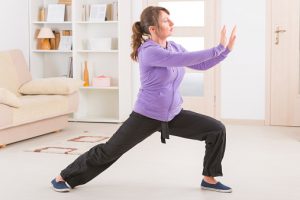 It is hard for young people to imagine themselves falling down and seriously hurting themselves. Getting a bruise or two is all they would expect, but sadly, seniors who sustain nasty falls could potentially die.
It is hard for young people to imagine themselves falling down and seriously hurting themselves. Getting a bruise or two is all they would expect, but sadly, seniors who sustain nasty falls could potentially die.
It is estimated that about 1.6 million older American adults go to the emergency room for fall related injuries. Assuming they survive, their fall will often result in fractured bones, loss of independence, and disability. Fear of falling again can also be a problem that restricts how often older adults leave their homes.
Advertisement
A new study into the ancient Chinese martial art of tai chi finds that it may help reduce the number of falls in both older adults and other fall risk adults. Tai chi offers a simple and holistic way to prevent injuries, according to the researchers.
Using an old martial art to improve balance
Tai chi is practiced all over the world for both its defense training and its health benefits. While a multitude of training forms exist, tai chi is known for being composed of very slow and rhythmic movements, allowing people of older age to perform them with relative ease.
The practice promotes flexibility and whole-body coordination. Previous studies have shown that tai chi can be great for improving balance control, a trait that is highly beneficial to the elderly.
The researchers wanted to find out if tai chi can really prevent falls, so they looked at 10 randomized controlled trials analyzing the effects of tai chi versus other treatments such as physical therapy and low-intensity exercise.
Tai chi reduces falls
The results of their analysis found that tai chi was backed by high-quality evidence, proving it significantly reduced the rate of falls by 43 percent compared to the other interventions mentioned at short term follow ups (less than 12 months) and by 13 percent at long-term follow ups (greater than 12 months).
Advertisement
Tai chi was also seen to reduce the risk of injurious falls by 50 percent in the short term, and by 28 percent in the long term.
“Tai chi practice may be recommended to prevent falls in at-risk adults and older adults. The length of the interventions ranged from 12 to 26 weeks. The frequency of the 1-hour sessions ranged from one to three times per week. Due to the small number of published studies, further research is needed to investigate the effect of tai chi on injurious falls and time to first fall,” said Rafael Lomas-Vega, Ph.D.
Related: Tai chi may prevent falls in older people and improve mental health: Study
